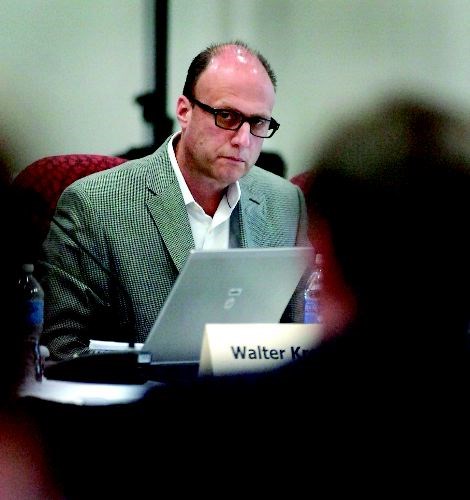It's no more than a verbal habit, but lawyer Christopher Jones often says "fair enough" after hearing responses from the Northern Gateway panel.
Yet the responses he elicited from witnesses over the past two days were neither "fair" nor "enough" to meet the standards set out by his bosses at the Province of B.C.
Jones questioned a witness panel on pipeline operations and spill response for two days at National Energy Board (NEB) hearings into the $6.5 billion plan to connect Alberta's oilsands with Kitimat, but was unable to get the company behind the plan to commit to specifics about the spill plan it currently has in place.
He wanted specifics about where the company would stage in the event of a spill, how long it would take responders to arrive at the scene and what techniques would be used to capture both oil on the surface and diluted bitumen that may sink when coming into contact with sediments. He was routinely told he and the province would have to wait until detailed reports are completed, perhaps as much as five years from now.
Those responses weren't good enough for provincial Environment Minister Terry Lake, who was monitoring the proceedings from Vancouver.
"It's difficult to say you're in favour of a proposal if you don't know the risks," Lake said in a phone interview.
Jones often used the phrase "Wouldn't it be nice to know right now" in the preamble to his questions about various aspects of the safety and spill recovery measures Northern Gateway is proposing, but invariably got the response that it's too early to give those exact details.
Enbridge Northern Gateway has indicated that its detailed spill response system won't be in place until six months before the pipeline is projected to go online sometime in 2018.
"I would say that's not acceptable to the province," Lake said. "We don't want to take it on a promise."
This summer the provincial government set out five conditions before it would consider approving the plan. Primarily at issue this week in the Prince George hearings is one of those conditions: whether Northern Gateway will be capable of putting together a world class spill response plan. Both the company and the province agree on the terminology, that something world class is required, but the two parties are nowhere close to agreeing on exactly what that means.
"They've verbally committed to a world class spill response system, but their answers at the hearings in Prince George have not provided with the assurances that's the case," Lake said.
Enbridge Northern Gateway president John Carruthers said there are good reasons why the company can't give specifics just yet. The company needs to get approval from the NEB before it can proceed with its final planning and there's no sense in putting together a specific spill plan if the final route isn't selected.
"What we've done is we've given examples of what [a spill response plan] would look like, we've gone to a thorough general oil spill response plan outlining what would come next and we've gone also to examples of site specific," Carruthers said during a visit to Prince George Wednesday. "It's not there in every case because that's not practical, it's not even recommended. We need to do the detailed engineering to understand the best responses for that particular area because we might move the route slightly and if you do that you change your spill response."
Jones challenged witnesses on the same point during the hearings, asking the Northern Gateway representatives what information they're missing right now that would prevent them from filing a detailed oil spill response plan.
Enbridge vice-president of health, safety and environmental support services Kevin Underhill said it's normal for companies to go through the approval phase without a final plan.
"We want the time to produce a robust plan," he said. "It's the time we need to develop a plan and it's the time we'll take to do it properly."
Jones and various Northern Gateway witnesses also went back and forth on what types of booms could be used, how the company would deal with winter conditions, what will happen with recovered oil in the case of a spill and what sort of auditing process the company plans to have in place for the pipeline.
Lake said that although the province isn't satisfied with what it's heard to date, he said there's still time for Northern Gateway to prove it can meet all the requirement set out by the government.
"The company could come back later in the process and provide answers," he said.



